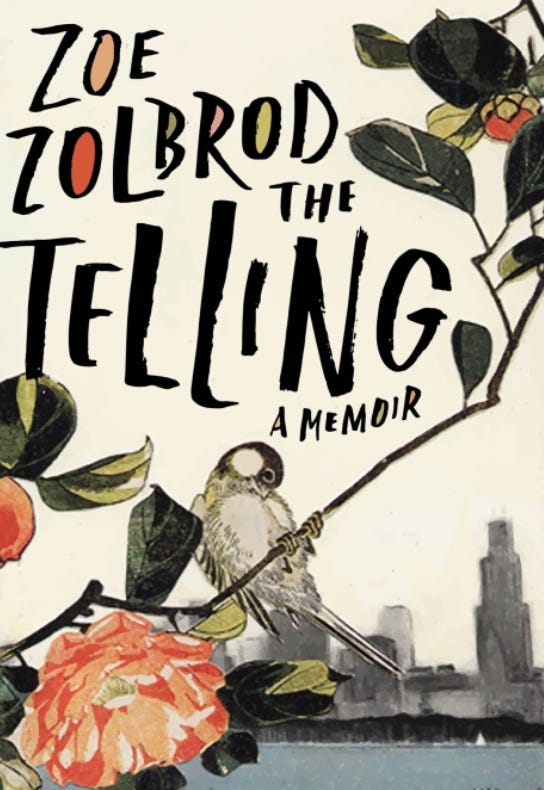A Book I Wish More People Knew About Vol. 11
Sarah Einstein on a memoir of abuse that also manages to be "a genuinely delightful read"
Here Sarah recommends Zoe Zolbrod’s The Telling, praised by Joanna Rakoff as “spellbinding” and by Claire Dederer as “evocative, fiercely intelligent, and beautifully constructed.”
A Book I Wish More People Knew About: Sarah Einstein on The Telling by Zoe Zolbrod
Zoe Zolbrod’s The Telling is a coming-of-age memoir focused on the question of what it has meant, to the author, to have been molested as a child. Written against the tropes of the genre—the lack of sexual desire, the difficulty connecting romantically, the life-long trust issues—Zolbrod says her goal is “to leave behind the flat prose of psychology texts and frame my own experience,” in the hope of connecting “across the page with others and ease the isolation I'd felt about this part of my life.” And leave it behind, she does. In this book, which mixes research with lived experience, Zolbrod examines how her molestation at the hands of an older cousin, which took place over a year when she was very young, has inflected, but not determined, the person, lover, wife, mother, and writer she has become. For this reason alone, it’s a key work in complicating the master narrative about the lived experiences of people molested as children.
It may also be why the book didn’t find more readers when it was originally published in the spring of 2016. While I can’t know this for sure, I suspect that the Trump campaign—when it became clear an actual sexual predator was going to be the Republican nominee—was not a moment when most of us were particularly interested in nuanced takes. We saw the harm that has come to us all, and we were doing our best to make sure everyone else did, too. I’m hopeful that readers are more receptive to these ideas now.
But I’m not recommending the book to you because I think it makes important and nuanced points. Or, that’s not the primary reason.
I’m recommending it to you because it is a genuinely delightful read.
Zolbrod brings her prodigious talent as a novelist to this work in a way that makes it, odd as this may sound, a lovely and compelling coming-of-age story. Her frankness and her flair for scene make this the very specific story of a very specific woman, one who we come to both like and admire.
She captures girlhood in a precise time perfectly. We sit with her in that family living room as she remembers the music she loved in junior high:
I had been drawn to music even before I had been drawn to whispers of masturbation, menstruation, and brassieres. There was the overheard, the glittery confetti of “Dancing Queen” at the ice rink, the slicked-up wail of Styx on a school bus eight-track. And there was my parents’ record collection, folk and folk pop, and the corner nook between the couch and the love seat where the stereo lived and the albums were stacked and I could just fit, crouched or cross legged, flipping through the covers—the lady with whipped cream for a dress; Peter, Paul and Mary against a brick wall—while listening, listening.
There is also some of the best writing about sex I have ever read in this book. She writes rapturously about the first time she sleeps with Carl, a man she meets in a Philadelphia punk house:
He was hypermasculine and campily feminine. He was huge and graceful and sure and louche. He had swiveling hips and a massive finger span and no shame. He was not afraid of any part of me and not afraid of hurting me or displeasing me. He was greedy, but also baldly fascinated by my avidity and receptivity. The strokes of his dick unloosed in me every pornographic cliché I’d imbibed in my near decade-long exploration of smut prose: I’m impaled, I thought ecstatically. He’s in me up to my throat! As each worn phrase exploded through my consciousness I felt like I was meeting truth, being made real.
She’s equally frank when she writes about how anticlimactic it was to finally tell a therapist about the molestation:
“Starting when I was four I was molested for about a year by the nephew, my cousin. I don’t think it had much of an effect on me, but it just seems like something I should say when we’re talking about this stuff. . . .”
She blinked behind her glasses, rims the same silver-gold color of her short hair, lenses that needed cleaning. “I’m sorry to hear that,” she said gently. “If you think it didn’t have much effect on you, you’re probably right.”
The book is a delight because the author is as well; like all the best protagonists, the Zoe of this memoir is a girl many of us can remembering being, or at least knowing, and a woman we can both feel kindship to and admire.
So yes, it’s a book about a very difficult subject. Kind of. But more, it’s a book about being a woman, and having been a girl, growing up in a very normal middle-class American home during the height of “the American Century,” when all things were meant to seem possible, but we pretended only good things could happen to us. It’s about growing out of that myth and into a deeper understanding that leads to the knowledge that we can be harmed without being diminished. That truth, really, is the great pay-off of this book, and it’s a truth we need to tell alongside the truth that, for some of us some of the time, the harms done to us do diminish who we can become.
Sarah Einstein is the author of Mot: A Memoir (University of Georgia Press 2015), Remnants of Passion (Shebooks 2014), and Tripart Heart (Sundress 2018). Her essays and short stories have appeared in The Sun, Ninth Letter, PANK, and other journals. Her work has been awarded a Pushcart Prize, a Best of the Net, and the AWP Prize in Creative Nonfiction. She teaches creative writing at UT Chattanooga.
Previously in “A Book I Wish More People Knew About”
Vol. 1: The Actual True Story of Ahmed and Zarga, recommended by Phyllis Mann.
Vol. 2: Laura & Emma, recommended by Teddy Wayne.
Vol. 3: The Woman Lit by Fireflies, recommended by Christine Sneed
Vol. 4: This. This. This. Is. Love. Love. Love., recommended by Casey Plett
Vol. 5: The Breaks by Julietta Singh, recommended by Neema Avashia
Vol. 6: The Circus Train by Judith Kitchen, recommended by Beth Kephart
Vol. 7: The Story of the Paper Crown by Józef Czechowicz, recommended by K.E. Semmel
Vol. 8: The Book of the City of Ladies, recommended by Kathleen B. Jones
Vol. 9: At-Risk by Amina Gautier, recommended by Kristen Gentry
Vol. 10: The Oblivion Seekers by Isabelle Eberhardt, recommended by James Reich






The Telling is really excellent--so happy to see it here this morning. ☀️